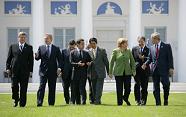Crisis
EU to offer $ 1.6 billion farm aid to developing nations
 The European Union plans to offer euro 1 billion (US$1.6 billion) to develop farming in poorer countries hard-hit by food shortages and soaring prices, the European Commission president said Monday.
The European Union plans to offer euro 1 billion (US$1.6 billion) to develop farming in poorer countries hard-hit by food shortages and soaring prices, the European Commission president said Monday.
Jose Manuel Barroso spoke as the Group of Eight summit of world economic powers opened in Japan, with the global food crisis, skyrocketing fuel prices, and climate change atop the agenda. On global warming, Barroso pressed G-8 leaders for a mandatory 50 percent cut in emissions by 2050.
“Those who were previously reluctant to commit to action have run out of excuses,''
Barroso said. Barroso represents the 27-nation EU at summits of the G-8, whose members are France, Britain, Italy, Germany the United States, Canada, Japan and Russia.
The commission president said the EU planned to spend euro1 billion (US$1.6 billion) from 2008 to 2009 on projects like buying “fertilizers and seeds, for instance, to help poor farmers in developing countries.” It could also be used for food assistance and safety net measures, he said.
The money will come from funds set aside for EU farm subsidies but not distributed because of the spike in food prices, Barroso's office said. More than 40 percent of the EU's euro100 billion-plus budget is spent on farm subsidies - traditionally a part of the budget that is set years in advance.
The proposal must still be approved by the EU parliament and EU Council of Ministers, Barroso's office said.
Developing countries have been the worst-hit by the world food crisis, leading to riots and protests from Africa to Asia and raising fears that millions more people will suffer from malnutrition. High oil prices, changing diets, urbanization, expanding populations, flawed trade policies, extreme weather, growth in biofuel production and speculation have sent prices of grain and other foods soaring around the world.
Tackling climate change, Barroso said the G-8 must agree to go further than last year, when leaders agreed to “seriously consider” the goal of a 50 percent emissions cut by 2050. The language was a compromise between the European Union, which wanted mandatory cuts, and the United States, which opposed them.
“We need a decision, a commitment, about this long-term goal,” Barroso said. He added that G-8 leaders should reach an agreement among themselves before trying to convince emerging powers, including China and India, to sign on.
By contrast, U.S. President George W. Bush's administration has not shown enthusiasm for such a commitment without cooperation from China and India.
“If we agree, then we are in a much better position to discuss with our Chinese and Indian partners and others,” Barroso said. He said the G-8 must avoid the attitude of “I will do nothing unless you do it first,” which he called a “vicious circle.”
(Published by AP - july 7, 2008)